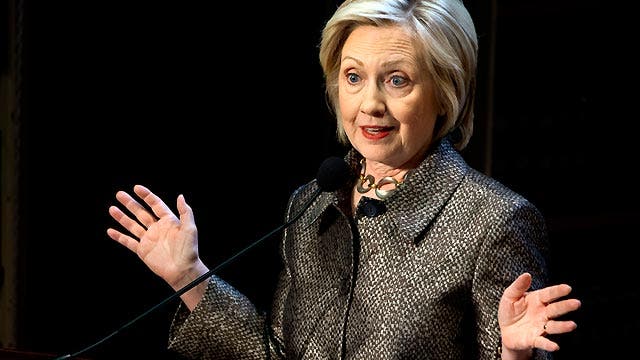Hillary Clinton's campaign strategy: duck the press?
Does the Democratic presidential candidate have an optics problem? 'MediaBuzz' host Howard Kurtz weighs in
A Washington watchdog group that first raised conflict-of-interest questions in 2011 about Hillary Clinton’s role as Secretary of State while her family’s foundation raised millions from foreign governments charged that foot-dragging and stall tactics kept a lid on the controversy for years.
Judicial Watch filed 160 Freedom of Information Act requests and 18 federal lawsuits over the last four years related to the Clintons. In December 2013, a federal judge ordered the State Department to comply with the disclosure law and, as a result, the nonprofit finally received 126 heavily redacted pages. There are, however, more than 1,000 pages of record to come, and no final date for when those records must be turned over.
“The State Department allowed Hillary Clinton to remove and destroy government email records ...."
“Our dogged work forced the disclosure of documents that provided a road map for over 200 conflict-of-interest rulings that led to $48 million for the Clinton Foundation and other Clinton-connected entities during Hillary Clinton’s tenure as secretary of state,” Judicial Watch President Tom Fitton said in a statement. “Previously disclosed documents in this lawsuit, for example, raise questions about funds Clinton accepted from entities linked to Saudi Arabia, China and Iran, among others.”
Among the documents turned over to Judicial Watch were records detailing former President Clinton’s dealings with Saudi Arabia, China and Iran. Emails that included the State Department’s Legal Adviser Office showed the department raised concerns in January 2011 about the former president’s dealings related to Saudi Arabia. The emails were heavily redacted, Fitton said, meaning the specific concerns remain unclear.
Judicial Watch is not declaring a hard-fought victory. In addition to the redactions, the nonprofit claims the State Department allowed Clinton to review what documents were turned over. Some 1,000 records Judicial Watch sought were turned over to the Clinton Foundation more than a year ago by the State Department, for the foundation to review before making public. The documents have not been released.
“There was no lawful reason to turn anything over to the Clinton Foundation for review,” Chris Farrell, spokesperson for Judicial Watch, said. “It was an administrative ‘stall tactic’ consistent with the Clintons' cover-up strategy and facilitated by a complicit State Department. This is a shameful manipulation of the FOIA process to hide information from the public.”
Shining a light on the Clinton dealings is complicated by the fact that Clinton used a private email account and server during her tenure as Secretary of State, and has admitted erasing more than 30,000 messages she alone determined were not public record.
“The State Department allowed Hillary Clinton to remove and destroy government email records, and now we’ve figured out the State Department is improperly giving government documents to the Clinton operation -- documents that should have been turned over to us years ago,” Fitton said.
State Department officials declined to comment.
"State Department policy is not to comment on ongoing litigation," a spokesperson wrote in an email.
Among the records Judicial Watch sought but did not obtain were documents relating to Hillary Clinton’s employment status, compensation and security clearance. Also missing, Fitton said, are requested ethics waivers Clinton received from the State Department, as well as details about the former president’s speech schedule and his personal or charitable financial relationships with foreign leaders and governments.
Activities of other key figures close to the Clintons are mentioned, but mostly remain undisclosed in public documents, such as the fully redacted exchange in June 2011 with Cheryl Mills, who defended Bill Clinton during his 1999 impeachment trial, served on the Clinton Foundation Board and worked for Clinton at the State Department.
Mills reportedly negotiated the ethics agreement on behalf of the Clintons and the Foundation requiring the Clintons to submit to conflict-of-interest checks, Fitton said. Despite this, Mills was involved in ethics reviews as chief of staff for Hillary Clinton at the State Department.
Judicial Watch is still running into bureaucratic roadblocks, even as Hillary Clinton campaigns for her expected 2016 presidential run. For example, State Department attorneys did not disclose a list of 200 conflict-of-interest reviews given to them by the foundation.
“Our lawsuit, which first exposed the Clinton foreign fundraising racket at the State Department, continues to be obstructed by Mrs. Clinton’s political operation,” Fitton said. “With these revelations of State Department concerns about the Clinton machine’s Saudi and Asian dealings, this simple FOIA lawsuit is providing the road map for those tracking Hillary Clinton’s abuse of office as secretary of state.
“In the meantime, the State Department seems to be more concerned about helping Hillary Clinton’s presidential campaign than following federal disclosure law,” he said.






















